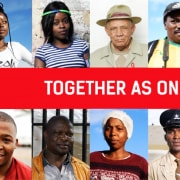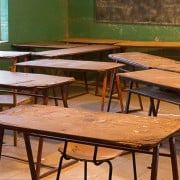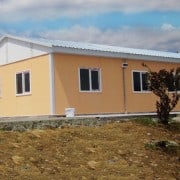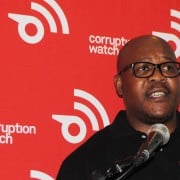|
Getting your Trinity Audio player ready...
|
The Model Youth South Africa (MYSA) Schools Challenge 2015 finished earlier in September on a high note. Together with Debate.Afrika, Corruption Watch guided another set of pupils towards a clearer understanding of corruption issues, and an improved set of debating skills.
The competition aims to expose senior high school pupils to dilemmas associated with transparency, democracy, accountability and corruption, using the tools of debate, policy making and public speaking. This prepares them for the moment they are ready to enter society, because they will understand the consequences of corruption and the benefits of transparency, and how each factor affects them. In this way they are able to play a useful, responsible role in their communities and the nation at large.
The inaugural MYSA challenge took place last year, culminating in April 2014 in a fiercely contested debate at the University of the Free State (UFS). Team Scythe walked off with the honours, having seen off competition from seven other teams.
The competition took place in several phases – teams first had to establish media campaigns with the theme My corruption-free school and produce public education material which they disseminated at their schools and in their communities. One member of each team then led the process of the second phase, a policy essay, while another two prepared speeches for the debate that marked the finale of the competition.
In 2015 the competition grew from 30 pupils and eight schools, to 70 pupils from 14 schools. Participants came from schools all over the province, making this year’s competition one of the biggest debate and public speaking competitions in the Free State. The competition received strong support from stakeholders such as the provincial Department of Education, UFS, the Central University of Technology, Nicro and the Free State Schools Debating Board.
Eager to learn and participate
This year’s competition was introduced at a pre-launch event on 1 August – here learners were familiarised with the competition rules and concept and given tips, techniques and training material. Corruption Watch presented an overview of how the organisation works, and Debate.Afrika hosted an exhibition debate for those learners who had not debated before.
The competition was launched on 15 August, where the number of schools and participants was finalised, and the public speaking topic for round one was revealed – As head of state, I promise to … to improve my country.
Corruption Watch and Debate.Afrika prepared the participants for the debates and public speaking competition by hosting workshops which helped them to understand issues of corruption as well as their responsibilities as young citizens. The pupils also received training on different debating methods.
This year teachers took a more prominent support role by mentoring debating teams and accompanying them to workshops and the final debate competition.
Competition hots up
The first round, focusing on public speaking, took place on 22 August. The contestants had just a week to prepare their five-minute speech where they took the role of the head of state. Once the speeches were done the pupils were divided into two groups for a panel discussion, which was scored by an experienced group of five judges.
In round two, which took place a week later, the participants submitted policy essays electronically to Debate.Afrika for assessment and scoring. The suggestion was made that in future competitions, pupils receive more training to improve their submissions, making them suitable for republishing on Corruption Watch’s website and other platforms.
On 12 September the Free State University hosted the pupils for the final round, the debate. Adjudicators on the day included Lehakoe Masedi (universities’ women’s open debate champion); Lehlohonolo Masilo (current chairperson of the UFS debate society); Devon Watson (Debate.Africa Academy coach); Neo Madala (UFS intra-varsity champion); Thembani Thembani (UFS debate society); Ntsapi Nhleko (UFS debate society); Siyanda Rixana (debate coach at HTS Louis Botha); Thabo Mokena (Debate.Africa adjudicator); and Samkele Monakali (adjudicator for the Pan-African Universities Debating Championship).
The motions for the MYSA debate competition were as follows:
- Round 1: This house believes that bribery is sometimes acceptable if it is for the greater good.
- Round 2: This house would not grant developmental aid to countries with blatant corruption.
- Round 3: This house would not allow officials who have allegedly committed acts of corruption to stand for re-election.
- Final round: This house believes that an honest government is more important than an effective one.
The 18 teams participating were whittled down, through the first three rounds, to two teams in the final round. The finalists were the LLT Ambassadors from Lenyora La Thuto secondary school, and Five 0, a combined team from Castle Bridge high school, Brebener high school, Navalsig high school and Oranje Meisies school.
Team Five 0 took the top honours for the debate session. They also took second place for policy making, after team Golden Speakers, and their member Anliri Brown of Oranje Meisies came tops in public speaking. Second in this category was Rethabile Molelekoa of the Golden Speakers and a pupil at HTS Welkom, and third was Navalsig High pupil Limpho Mogoera, of team Naval Legends.
The overall winner was team Five 0.







